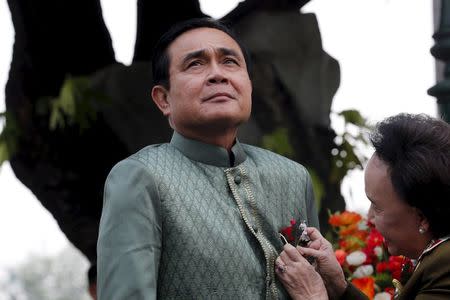Thai junta could opt for a previous constitution if draft rejected, panel official says

By Amy Sawitta Lefevre BANGKOK (Reuters) - Thailand's junta could pick one from among 19 previous constitutions if a July referendum rejects a draft charter unveiled last month, a constitutional panel spokesman said on Tuesday. The January document was the junta's second attempt at a draft after the previous charter was torn up following a May 2014 coup by the military. Critics, including Thailand's main political parties, say the draft constitution is likely to be rejected in the nationwide referendum required to approve it, so delaying the time frame for a general election. Those fears have prompted Prime Minister Prayuth Chan-ocha to repeat over the past week that an election will take place in 2017. There are no guidelines telling the junta what to do if the constitution is rejected in July, said Norachit Sinhaseni, the spokesman of the Constitution Drafting Committee. "If it doesn't pass, then it is no longer written anywhere what to do," he told reporters in Bangkok, the capital. "One way that has been proposed is the NCPO comes up with a solution," he said, referring to the junta by the abbreviation of its official name, the National Council for Peace and Order. "The cabinet or NCPO may pick from one of Thailand's previous constitutions." He did not say how likely such a choice might be, but added that some recent charters would not meet present needs. A new constitution would be Thailand's 20th in 84 years of often turbulent democracy. Thailand's long-running political crisis broadly pits supporters of former Prime Minister Thaksin Shinawatra against a royalist establishment backed by parts of the military. Some see the crisis as a struggle over who will hold power once the reign of King Bhumibol Adulyadej, 88, eventually ends. Anxiety over the succession is seen as an aggravating factor in Thailand's bitter political divide. Chief among the concerns raised by critics of the draft constitution is that it grants the military absolute power to do whatever it deems appropriate in the name of national security. But both the critics and the drafters of the constitution agree it will not resolve long-running troubles. "Look, whatever we draft it is not a cure-all," said Norachit. A military-appointed reform council rejected a first draft in September over worries it could have enabled a military-backed takeover of the government during a crisis and could erode the power of political parties in favour of the army. (Editing by Clarence Fernandez)

